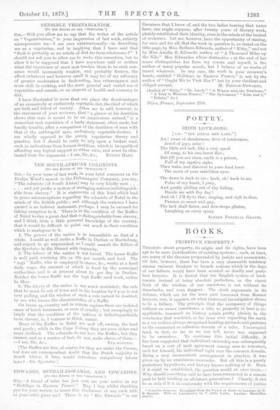THE SOUTH-AFRICAN COLONISTS. [To Trig EDITOR OF TES "SPROTA.T011.1 'SIR,—In
your issue of last week, in your brief comment on Sir Evelyn Wood's speech to the Fishmongers' Company, you say,
The colonists [of South Africa] may be very kindly men . . .
. . and yet prefer a system of managing natives indistinguish- able from slavery." It is statements of this kind which lead to gross misconceptions regarding the colonists of Natal in the minds of the British public ; and although the sentence I have quoted is an indirect statement, Perhaps I may be excused for taking exception to it. There is in the condition of the Kaffirs of Natal to-day a great deal that is distinguishable from slavery, and I think, from a little personal knowledge of the country, that it would be difficult to point out much in their condition which is analogous to it. I. The person of the native 113 as inassailable as that of a white. I could as well strike a Kaffir in Durban or Maritzburg, and expect to go unpunished, as 1 could assault the Editor of the Spectator in the Strand with impunity. 2. The labour of the native is not forced. The house Kaffir is well paid, receiving 20s. or 30s. per month, and food. The
togt " Kaffir, who is employed in stores, &c., works at a fixed daily wage, the amount of which is fixed by the municipal authorities, and is at present about 2s. per day in Durban. Neither the house Kaffir nor the togt Kaffir need work, unless he likes.
3. The liberty of the native is not much restricted ; the rule that he must be out of town and in his location by 9 p.m. is not very galling, and the wisdom of such a rule cannot be doubted, by one who knows the characteristics of a Kaffir.
On farms up-country and in remote regions there are isolated Cases of harsh treatment, or even of cruelty ; but sweepingly to imply that the condition of the natives is indistinguishable from slavery, is, I venture to think, unfair.
Many of the Kaffirs in Natal are well 'off, owning the land and goods ; while iu the Cape Colony they are even richer and more civilised. The colonists do not love the Kaffirs, but they eannot, and as a matter of fact, do not, make slaves of them.-
[The Kaffirs are free, of course, for they are under the Crown; but does our correspondent doubt that the Dutch majority in South Africa, if free, would introduce compulsory labour laws P—En. Spectator.]
































 Previous page
Previous page